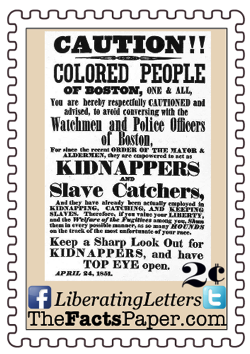September 18, 2019
Dear Liberty,
As the Founding Fathers composed and debated the Declaration of Independence and the Constitution of the United States, they understood slavery was a disease forced upon the colonies by England’s King George III. Many Founders wanted to address and abolish slavery from the start, as demonstrated by Thomas Jefferson’s scathing condemnation of the king in the Declaration. (see The Forgotten Midnight Ride) The colonists tried multiple times to end slavery in their areas, yet were always overruled by their British leadership or the king himself. (see The Color-Blindness Of Slavery)
Once the colonies began composing their own state constitutions, following their declared independence, many in the North willingly abolished the unwanted institution. (see Free And Equal) Likewise, the Northwest Ordinance of 1787 helped establish a free North. (see Charting A New Course) Unfortunately, the country was not unified on this issue, forcing Congress and presidents to take various actions over the years, including the Fugitive Slave Laws, to hold the country together.
To honor states’ rights, the Founders including Article IV, Section 2 in the Constitution to address slaveowners’ concerns of escaped slaves reaching the recently declared free states and territories, who wanted confirmation that they would be able to get their runaway slaves back. (see Constitution Day) Without condoning slavery or making it a Constitutional right, the document declared:
"No Person held to Service or Labour in one State, under the Laws thereof, escaping into another, shall, in Consequence of any Law or Regulation therein, be discharged from such Service or Labour, But shall be delivered up on Claim of the Party to whom such Service or Labour may be due."
Secretly, most Founders were praying the states would realize the horrors of slavery and end it on their own as some were already doing, allowing it to peacefully dissolve. Unfortunately, the South proved only to grow more dependent on it.
Fearing the general language did not protect free blacks from being captured and forced into slavery, Pennsylvania Governor Thomas Mifflin asked President George Washington to clarify the clause. Congress responded with the Fugitive Slave Act of 1793. While it gave slaveowners the right to retrieve their runaway slaves in other states, it was not widely enforced. Captured suspected fugitives were taken to a judge or magistrate where the fugitive’s status as a slave had to be proven, yet that could be done with just the word of the slaveowner.
ABOLISHING MISTAKES

Seeing fugitives as people and not property, abolitionists willingly helped the escaped slaves. Anyone doing so risked a $500 penalty and possible jail time, prompting Northern states to pass Personal Liberty Laws. Protecting citizens from punishment for acting on their 'personal liberty' to not turn in fugitives, they also tried to prevent the kidnapping of free blacks who could be placed into slavery by corrupt judges by requiring both stronger evidence to prove slave status as well as jury trials. Northerners also responded by organizing the Underground Railroad, which was functioning as early as 1810. (see America’s Moses) Citizens willingly accepted the threat to their own liberty by opening their homes to fugitives. By the late 1820’s, the tow roads constructed for the new canals in Ohio became convenient guides for the escaped slaves as they made their way to freedom. (see Locking In Our Future)
Unfortunately, Northerners’ fears were confirmed as free blacks, even ones who were always free, fell prey to the corrupt system. Two men kidnapped Solomon Northup, a freeborn musician, in Washington D.C. in 1841. Sent to Louisiana, Northup was forced into slavery for 12 years. After gaining back his freedom in 1853, Northup shared his story in book entitled 12 Years A Slave, which helped expose the corruption involved in the enforcement of the Act.
Personal Liberty Laws tried to control the corruption as those hunting fugitives were prosecuted for violating state law. One such case became a turning point in the issue. Professional slave catcher Edward Prigg was hired in Maryland to enter Pennsylvania and retrieve a suspected fugitive. Despite a magistrate denying the proper certification required to remove someone, Prigg took Margaret Morgan and her two children back to Maryland. Therefore, Pennsylvania charged and convicted him of kidnapping. Taking his case to the Supreme Court, eight of the nine justices voted to overturn Prigg’s conviction in Prigg vs. Pennsylvania. In their ruling, the justices declared state personal liberty laws could not supersede federal fugitive slave law. However, the ruling also designated that states were not required to provide its enforcement, placing the responsibility on federal agents.
This ruling tore an even larger rift between the North and the South as Northern states were now legally able to remain hands off from complying with the Fugitive Slave Law. This infuriated Southerners who believed Northerners were interfering with their efforts to recover their escaped slaves. After years of louder and louder bickering from both sides, Representative Henry Clay, the author of the Missouri Compromise of 1820, once again stepped in to stick a bandaid on a gapping wound. (see Charting A New Course) Teaming up with Democrat Senator Stephen Douglas from Illinois (see Disunity Of The Union and Sibling Rivalry), he proposed five resolutions in one large bill on May 8, 1850, known as the Compromise of 1850, which used California's desire to enter as a free state as a bargaining chip.
The five proposals were:
1. California would be admitted as a free state
2. Popular vote in New Mexico and Utah would
determine their slavery status
3. The Republic of Texas would surrender their claims
to the lands of New Mexico and compensated $10 million
for it
4. Slavery would continue in Washington DC, yet the
slave trade would end
5. The Fugitive Slave Act was strengthened with stricter
penalties
President Zachary Taylor, a celebrated general in the Mexican-American War, supported California, which upset Southerners. (see Victory Or Death!) Yet Taylor did not agree with Clay's compromise, not wanting Congress to get involved in legislating slavery in any way. However, when Taylor died in July, his successor, Millard Fillmore, encouraged Clay to move forward.
When the Senate failed to back the combined bill, the five pieces were resubmitted as five separate bills. Congress passed the Fugitive Slave Act of 1850 on September 18, 1850, which created federal commissioners to enforce it per Prigg vs. Pennsylvania, giving them the sole responsibility of deciding the fate of captured suspected fugitive slaves.
The new Act denied fugitives a jury trial or even the opportunity to testify in his or her own defense. Guilt or innocence was determined exclusively by a federal commissioner, who, according to the legislation, was paid $5 for every fugitive they declared free and $10 for those they declared a slave. This only fueled the abolition movement in the North as they recognized the obvious bribery baked into the law.
As a result, fugitives and legally free blacks, including those born into freedom, fled to Canada in droves knowing they would not receive a fair ruling. A year earlier, Harriet Tubman escaped into Pennsylvania and became the most famous conductor in the Underground Railroad. Instead of slowing down their work, the Act just forced them to extend the tracks further north as Harriet returned to the South more determined than ever to help as many people as she could obtain their God-given liberty. (see Americas Moses)
Instead of bridging the slavery gap, the Act only deepened the ravine. Abolitionists grew more determined to end slavery as many used their pen as their sword. Starting in 1851, families throughout the country, especially those in the North, learned the truths of slavery in Harriet Beecher Stowe’s Uncle Tom’s Cabin. Harriet Ann Jacobs, who escaped to New York in 1842, spent years constantly looking over her shoulder as her owner tried several times to find her. After being bought by her employer and freed immediately in 1852, she wrote of her life experience in Incidents in the Life of a Slave Girl, which revealed even more aspects of slavery even Northern sympathizers were unaware of, or chose to ignore. (see The Great Escape) Jacobs worked with ardent abolitionist Frederick Douglass to end the horrible practice once and for all. (see Reading, Writing, And Redemption) The Fugitive Slave Law only strengthened his arguments which he shared in his newspaper The North Star.
To further ensure compliance to the new Act, penalties for helping fugitives increased from $500 to $1000 with a 6-month jail sentence. In addition, federal agents who did not fully execute the Act, either on the fugitive or someone helping them, were also heavily fined. Regardless, states and citizens in the North continued to not comply, making enforcement difficult. They passed more Personal Liberty laws which the South included as part of their justification for seceding from the Union. (see Constituting Slavery) Between the Act's passage in 1850 and Lincoln's election in 1860, 343 suspected fugitives were presented to federal commissioners. Only eleven of them remained free in the North, while 332 were placed into slavery, a couple for the first time ever.
The Republican Party formed in 1854 following Sen. Douglas' Kansas-Nebraska Act by congressmen tired of Whigs and Democrats promising solutions only to deliver more problems with slavery. (See The Birth of a Movement and Charting A New Course) Republican and Free Soil lawmakers tried to repeal the Fugitive Slave Law several times without success while abolitionists fought the law in court. One case made it to the Supreme Court with an 1859 ruling upholding its Constitutionality. This is the same SCOTUS of 7 Democrats (with one replacement) and 2 Republicans that delivered the Dred Scott Decision just two years earlier, describing slaves as property and allowing them to be taken into free states by their owners without risking losing that "property". (see Dreadful Scott Decision)
Liberty, progressives on the far left want to forever punish America for her involvement in slavery. Ignoring Native Americans practiced slavery before Europeans even touched the continent as well as most Western civilization at the time, they want to forever discredit our founding. The truth that white Irishmen were much more prominent indentured servants than Africans, as well as the first official slave owner was a black man, is being scrubbed from our history. (see The Color-Blindness Of Slavery) Even worse, those who fought to end slavery, including the efforts of our Founding Fathers, are purposely suppressed and concealed. (see Inalienable Rights and The Forgotten Midnight Ride) Yet they have to do this because it is the only way they can manipulate people to accept their primary goal. Progressives want to tear America completely down so they can rebuild it with their socialist utopia ideology, which has never in the history of the world worked.
Abolitionists tried to end slavery even before we became an independent country and continued as the Republican Party, passing the 13th, 14th, and 15th Amendments with a solid majority in Congress. (see Americas Voting Record) They also were finally able to repeal both Fugitive Slave Acts on June 28, 1864. Meanwhile the Democratic Party, the party of the progressive left, are responsible for pushing and spreading slavery throughout the country, starting with their founder, President Andrew Jackson. (see Satans Manifest Destiny and Civil RightsAnd Wrongs)
The best defense against these lies and historical rewrites is the truth. Continue to study all American history, Liberty, both the good and the bad. America has made mistakes but she has also been that “shining city on the hill” on endless occasions. It is up to every generation to keep the city shining, not just for America, but for the world to see and benefit from.
That’s my 2 cents.
Love,
Mom



